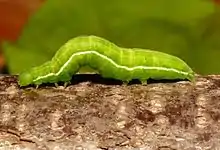| Gold spot | |
|---|---|
.JPG.webp) | |
| Scientific classification | |
| Domain: | Eukaryota |
| Kingdom: | Animalia |
| Phylum: | Arthropoda |
| Class: | Insecta |
| Order: | Lepidoptera |
| Superfamily: | Noctuoidea |
| Family: | Noctuidae |
| Genus: | Plusia |
| Species: | P. festucae |
| Binomial name | |
| Plusia festucae | |
Plusia festucae (gold spot) is a species of moth of the family Noctuidae. It is found throughout the Palearctic realm from Ireland to Japan.
Technical description and variation
The wingspan is 34–46 mm. Forewing deep golden brown, with a golden metallic sheen at base of costa, on inner margin of median area, and on an oblique patch before apex; lines all oblique, dark brown; veins dark brown; at base of vein 2 a large silvery rounded blotch, with a smaller, more elongate, one beyond it; the lowest streak of the apical blotch, below vein 6, and a spot at base of costa are also silvery; hindwing bronzy fuscous, with pinkish fringe.[1]

Biology
The moth flies from June to September depending on the location.
Larva green; dorsal line dark green, edged with white; subdorsal and lateral lines white; spiracular yellowish; head green. The larvae feed on Carex, Sparganium erectum, Iris pseudacorus and Alisma.[2] Pupates in a whitish cocoon on the underside of a blade of grass, doubled over for the purpose.
References
- ↑ Seitz, A. Ed., 1914 Die Großschmetterlinge der Erde, Verlag Alfred Kernen, Stuttgart Band 3: Abt. 1, Die Großschmetterlinge des palaearktischen Faunengebietes, Die palaearktischen eulenartigen Nachtfalter, 1914
- ↑ "Robinson, G. S., P. R. Ackery, I. J. Kitching, G. W. Beccaloni & L. M. Hernández, 2010. HOSTS – A Database of the World's Lepidopteran Hostplants. Natural History Museum, London".
External links